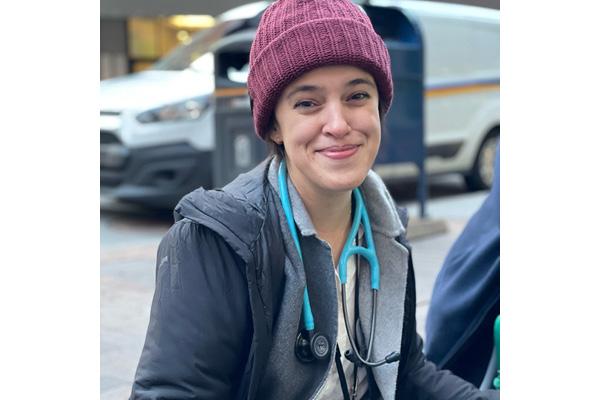-
About
- Departments & Offices
-
Academics
- Public Health
- Biomedical Sciences
- Physician Assistant
- Special Master’s (MBS)
-
Admissions & Financial Aid
- Tuition & Fees
-
Student Experience
-
- Student Resources by Program
- Academic & Student Support
- Wellness & Wellbeing
- Student Life
- Events & Traditions
-
-
Research
- Research Labs & Centers
- Tufts University-Tufts Medicine Research Enterprise
-
Local & Global Engagement
- Global Health Programs
- Community Engagement
Alumni Profile: Becky Lee
Becky Lee’s, M17, passion for treating the medically underserved was fostered by the partnerships she developed while at Tufts University School of Medicine. Her legacy continues as a physician on the Street Team at Boston Healthcare for the Homeless.

Dr. Lee found her place at the Tufts University School of Medicine (TUSM) through the Tisch College of Civic Life’s Community Service Learning (CSL) programming and under the mentorship of Jen Greer-Morrissey, now the Civic Life Program Manager for Health Sciences at Tisch College. She forged her own path to becoming a civically engaged physician working with unhoused patients on the streets of Boston. “The CSL program, and especially Jen, was this small community within the medical school, where I could go and feel like there were like-minded people who felt as passionately as I did about those issues.”
In addition to her full course load as a medical student, Dr. Lee worked weekly with the Street Team at Boston Healthcare for the Homeless (BCHCP) and coordinated the first annual Health and Human Rights week (now Justice for the Homeless Month) at TUSM with lectures, workshops, and film screenings. She also founded the Student Coalition on Addiction, a coalition of students from all four medical schools in Massachusetts to advocate for increased addiction treatment services. She notes that “I felt it was really good that at Tufts there was a specific place for that to be explored.” Her commitment to this work was honored with a Presidential Award for Civic Life.
Dr. Lee established the first student connection between TUSM to and Boston Healthcare for the Homeless Program’s Street Team. As a first-year medical student, she “wanted to do something that would remind me on a regular basis why I was going through the first two years of med school… I was listening to the radio one day, and I heard Jim O'Connell [founding president of BHCHP] speaking on the radio and thought, ‘wow, his work sounds really interesting. I think I'll email him.’” This led Dr. Lee to spending every Thursday morning with Dr. Dave Munson, TUSM grad and now Medical Director of BHCHP’s Street Team, as he provided care for Bostonians living in the streets. This partnership persists to this day, as Tufts students continue to go out with the Street Team.
In recognition of the complex social and health needs of those living on the streets, and by considering the ways that the medical system was not serving them, Dr. Lee brought her experiences back to her medical school peers through the creating of “Health and Human Rights Week.” Dr. Lee and her fellow students brought in leaders in the field, including Monica Bharel, then Chief Medical Officer of BHCHP and later the Commissioner of Public Health for Massachusetts, to speak with students on caring for the unhoused. Health and Human Rights Week is now Justice for the Homeless Month, funded by the Tisch Fund, and is in its tenth year of informing and inspiring TUSM students.
At the time that Dr. Lee was at TUSM, the opioid crisis was starting to garner attention nationwide, coinciding with the sudden closing of the Long Island Bridge, a vital connection for unhoused Boston residents to access shelters and addiction treatment programs. These news stories and their fallout inspired her to act. “The Student Coalition on Addiction is something I'm really proud of and it started out being called Medical Students for Long Island… when the Long Island Bridge in Boston was closed overnight without any warning and people were cut off from their addiction treatment services and homeless shelters.” Together the coalition of medical students throughout Massachusetts successfully pushed for medical schools to provide universal Narcan training and create curriculums around addiction, in addition to lobbying Beacon Hill for more comprehensive addiction services. The Student Coalition on Addiction continues to advocate for Massachusetts residents with and at risk for substance use disorders.
Dr. Lee’s focus on serving the most vulnerable patients within our community, and her dedication to embedding this work into a robust medical education, makes her a model for how to be a civically engaged physician. “I work with an amazing interdisciplinary team, and it's unlike most jobs in medicine. I don't spend very much time speaking with other doctors, or medical personnel, but case workers and social service providers because most of my patients’ primary needs… stem from social and economic disparities.” She has created opportunities not only for her patients to receive necessary medical care, but to ensure that others are able to follow in her footsteps.